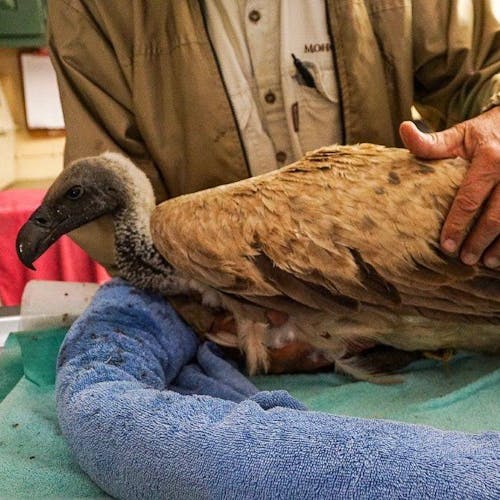WILDLIFE VOLUNTEERING: THE RED FLAGS MOST PEOPLE MISS
Learn more
Project News: poisoning at Kruger National Park
On Thursday 7 March 2024, the team from Moholoholo Wildlife Rehabilitation Centre were called by the Endangered Wildlife Trust (EWT) to a major poisoning in the northern area of the Kruger National Park in South Africa, due to their expertise in treating poisoned vultures.
Upon arrival at the scene, the results of the poisoning were devastating. The wildlife that were found to be dead or dying when they arrived on the scene included: one buffalo, one hyena, one jackal, 69 white-backed vultures (critically endangered), four lappet-faced vultures (endangered), two bateleurs (endangered), one marabou stork, one cape vulture, one tawny owl, and two hooded vultures (critically endangered).
Poisonings like this are a time-critical emergency and due to the vastness of the Kruger National Park, by the time they were able to get to the remote area, most of the animals were found deceased at the scene. However, the team at Moholoholo, along with EWT, local veterinarians, and South African National Parks (SANParks), were able to rescue two white-backed vultures who have been taken to the centre and will begin the rehabilitation process, aiming to release them back into the wild.
Martial Rappo, manager of Moholoholo Rehabilitation Centre, commented: “Moholoholo has treated numerous poisoned vultures over the years and we currently have a very high success rate of getting them back into the wild again.” So we are hopeful that the outcome for the two newest arrivals will be positive.
The Greater Kruger is a target for poisonings by poachers for various reasons, including the targeting of species such as lions, which have a commercial value, or vultures, which are used in traditional medicine. A carcass, in this case a buffalo, is laced with pesticides containing a very potent poison. A carcass such as this would naturally draw in a huge variety of species, from large predators such as lions to specialist scavengers such as vultures.
Aside from targeting specific animals due to their commercial value, it is also thought that poachers focus on removing vultures from areas they intend to operate in, as vultures act as early detection species, alerting anti-poaching units to the presence of an illegally poached animal, such as a rhino.
Due in part to poisonings, vulture populations are in a steep decline, and Rappo states that “we're losing a significant percentage of the total vulture population in the Kruger National Park every year. It's quite horrifying to think about it.”
This recent event is a stark reminder of the challenges Moholoholo and other conservationists face to protect the species and ecosystems within southern Africa.
